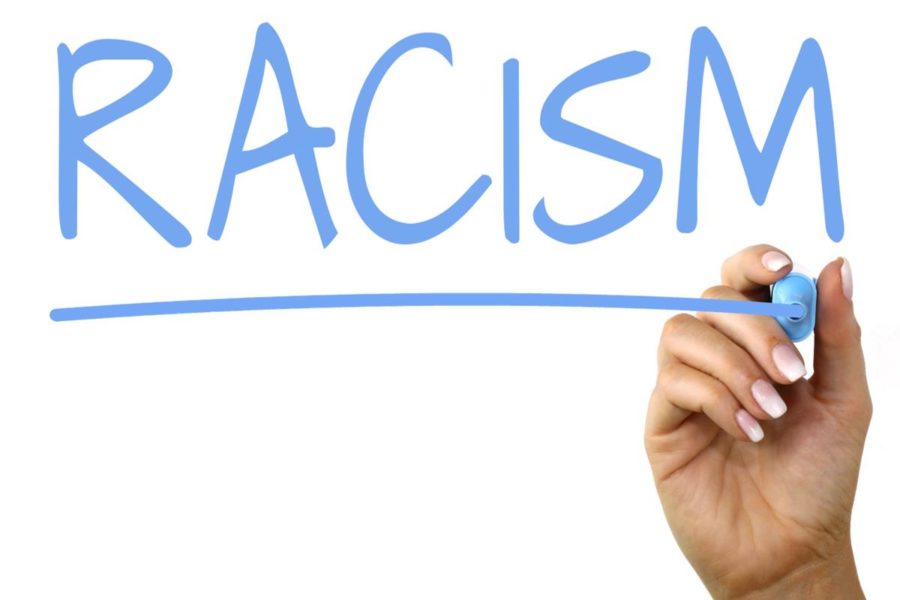Rochford: Racial power does not make an ideal society
Courtesy of The Blue Diamond Gallery
Columnist John Rochford argues racism defined as “power plus privilege” can be manipulated to suit different circumstances. Rochford believes a society formed around racial power is not an ideal one.
November 10, 2019
The root of many conversations around racial issues today centers around the concept of power. Power, however, is a tricky and risky concept to coalesce around.
Indeed, even the “new” or more modern definition of racism (or any -ism) is no longer defined by the dictionary definition. Racism, in certain academic settings, is defined as power plus privilege.
In other words, any individual who possesses power, privilege or both is eligible to be a racist or is a racist automatically.
If one subscribes to “White Fragility” author Robin DiAngelo’s theories, simply by virtue of being born white. In the minds of the adopters of this racial definition, there is no question about the privilege aspect: white people, or any numerically larger populations, have privilege; minority populations do not.
In the end, according to the definition, whites can be racist, but black or brown people cannot be racist. The definition is convenient and indeed a tool to those who put its use into practice.
Stark examples of the cognitive dissonance that is needed to subscribe to the power plus privilege definition occurred at a university of our neighbor to the north, Canada, about three years ago. They are described in the aptly titled article, “Dear White People, Please Stop Pretending Reverse Racism is Real” published by Vice.
The group named Racialised Students’ Collective at Ryerson University kicked white journalism students out of a meeting because they were not “marginalized or racialized.” In another incident, Black Lives Matter – Toronto refused to sell T-shirts to whites during a Pride parade. At a panel for queer black people, whites were asked to move to the back to make space for black attendees.
The motive of the article, as the title suggests, claims that these actions are not racist because minorities have no power or privilege to enforce their ideas.
Interesting, since those same people in power of the events refused to sell products based on racial preference and held seating orders based upon race, engaged in the same discriminatory practices they claim to fight. Cognitive dissonance indeed!
The same types of practices occurred at the University of Missouri, where racial lists of demands and attempts to prevent media from covering the events based on race occurred more than once.
Another occurrence nearly brought down a small but historic bakery near Oberlin College, and this past summer I wrote about an event where ticket prices where differently priced based upon race (more expensive for whites).
These are a few, but certainly not exclusive, examples of such ways in which this definition can be maneuvered to engage in acts that would otherwise be considered discriminatory.
To base our society of ideas like this is simply not a good idea.
In the last few weeks, and perhaps right on schedule, Halloween season brings out the nearly guaranteed discussion on cultural appropriation.
In the Iowa State Daily two weeks ago, I was surprised to see a student quoted in an article arguing that the United States is erroneously a mixing pot of cultures and that appropriation manifests beyond Halloween: “[Appropriation] can be seen abundantly through the Halloween time as white people are dressing as another race and in most cases, representing rappers or criminals. Cultural appropriation is seen all over from cornrows to making your skin darker, to twerking, to using slang or altering your voice to sound like another person, to achieving bigger lips, to utilizing the term ‘spirit animal.’ It is seen in everyday life, not just Halloween, because more and more white people are observing other cultures and picking and choosing what they like and adopting it as their own.”
The implication is, essentially, appreciate other cultures’ existence, but do not partake. Stick to your own cultural practices.
Of course, cultural appropriation is perfectly acceptable according to author Jenna Jackson, who said “Minority groups can mock white people. They can mimic dominant culture. They can even completely assimilate into ‘respectable behavior’ if they so choose. There are levels of social benefits and costs to doing so. But, minority groups will never be able to appropriate ‘white culture’…”
If a society is formed based around racial power, that society probably is not a good one, but that path is a two-way street. There should be a level of caution in suggesting society is simply a struggle for power, for in some ways it legitimizes your opposite or opponent’s attempts to capture that power and in the end, society would be — in some ways naturally — at conflict with each indefinitely along racial lines.
That is certainly not an ideal society to live in.







